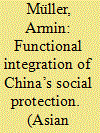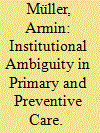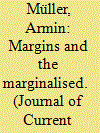| Srl | Item |
| 1 |
ID:
156668


|
|
|
|
|
| Summary/Abstract |
Frictions between China’s institutional legacies of the planned economy and the new trends of marketization, urbanization, and migration have shaped institutional change in social protection. Focusing on health and pension insurance, this study identifies a gradual process of functional integration, which overcomes the frictions and facilitates a dualization of benefits.
|
|
|
|
|
|
|
|
|
|
|
|
|
|
|
|
| 2 |
ID:
147646


|
|
|
|
|
| Summary/Abstract |
Most migrant workers in mainland China are officially covered by the New Rural Cooperative Medical System (NRCMS), a rural health insurance system that operates in their home communities. The NRCMS and the system of household registration (户口, hukou) are tightly linked and systemically interdependent institutions. Migrant workers have difficulties benefitting from this social protection because it remains spatially separated from them. Only a minority have access to urban health insurance systems. This paper sheds light on the institutional origins of the coverage problem of migrant workers and examines crucial policy initiatives that attempt to solve it. In the context of the ongoing hukou reforms, these policies aim to partially dissolve the systemic interdependence of hukou and health insurance. While the policies provide feasible, yet conflict-prone, solutions in short-distance and concentrated bilateral migration systems, covering migrants who cross provincial boundaries remains a challenge.
|
|
|
|
|
|
|
|
|
|
|
|
|
|
|
|
| 3 |
ID:
167486


|
|
|
|
|
| Summary/Abstract |
Village health stations (VHSs) are core providers of health services in rural China, responsible for almost a quarter of all consultations and outpatient services nationwide. During the reform period, misfit regulatory institutions have negatively influenced the quality of their services, as they require self-employed doctors mainly funded through out-of-pocket payments to provide unprofitable preventive care, and cheap primary care services. This study explores the effects of health reforms on VHSs over the last two decades, arguing that the institutional ambiguity resulting from these misfit institutions negatively affected the outcomes of core health reforms. This is evident in the stronger performance of VHSs where doctors are salaried employees. Recent pricing reforms may also come to improve the performance of the private sector.
|
|
|
|
|
|
|
|
|
|
|
|
|
|
|
|
| 4 |
ID:
147644


|
|
|
| 5 |
ID:
145127


|
|
|
|
|
| Summary/Abstract |
In late 2002, the Chinese government launched an initiative to extend the coverage of health insurance in rural China with the New Rural Cooperative Medical System (NRCMS). It covered all of rural China by 2008 and is being continuously adapted and developed. This study explores two conflicting goals in the policy design: universal coverage and voluntary enrolment. Local governments often faced the problem that only insufficient numbers of villagers were enrolling voluntarily. They developed different strategies to cope with it: Complementary outpatient reimbursement via medical savings accounts (MSAs) effectively transferred villagers’ premiums back to them, thus making the NRCMS more attractive. Adapting the premium-collection process to the local context or utilising collusive practices allowed them to pay premiums on behalf of the villagers from the insurance funds. These strategies undermine the effectiveness of the NRCMS as a risk-pooling mechanism, facilitate latent coverage gaps and turn it into a tax-funded service.
|
|
|
|
|
|
|
|
|
|
|
|
|
|
|
|
| 6 |
ID:
164414


|
|
|
|
|
| Summary/Abstract |
China's healthcare system is governed by institutions that are mutually incompatible. Although healthcare providers are supposed to offer affordable curative care services and engage in public health and administrative work, they receive insufficient financial support from the state and rely on generating informal profits and grey income. The “institutional misfit” between this public welfare mandate and medical service providers’ market orientation is particularly pronounced in the case of township health centres (THCs), a generalist type of healthcare provider with a key role in China's healthcare system. Based on fieldwork in four county-level jurisdictions, this study explores how local governments and THCs interact to cope with institutional misfit. It sheds light on a large variety of informal practices pertaining to human resources, healthcare services, drug procurement, health insurance and capital investment. Local governments deliberately neglect regulatory enforcement and collude with THCs to generate informal profits, behaviour which undermines service quality and increases healthcare costs. The study also shows that while the New Healthcare Reform altered the informal and collusive practices, it has failed to harmonize the underlying institutional misfit. To date, we see only a reconfiguration rather than an abandoning of informal practices resulting from recent healthcare reforms.
|
|
|
|
|
|
|
|
|
|
|
|
|
|
|
|